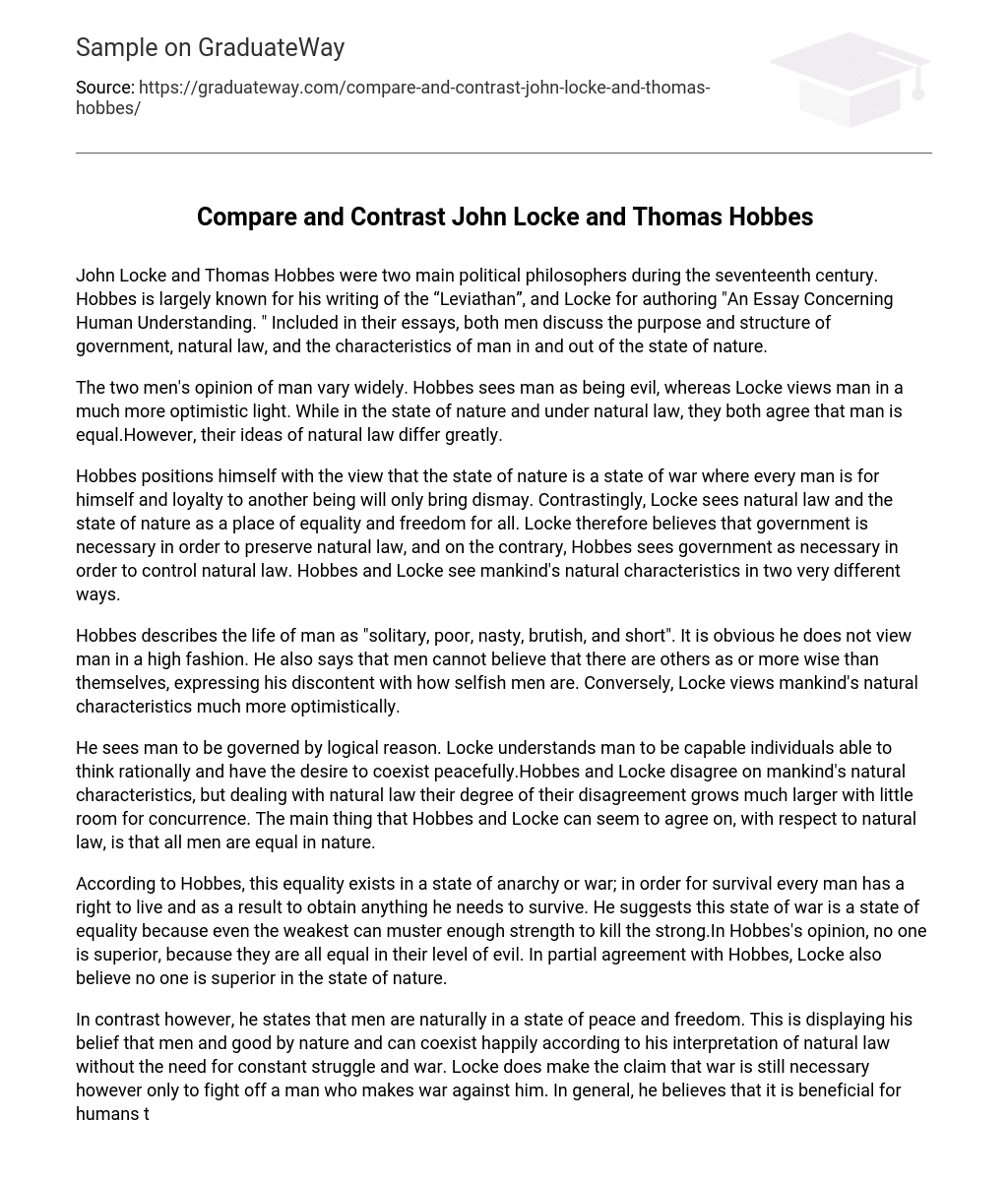John Locke and Thomas Hobbes were two main political philosophers during the seventeenth century. Hobbes is largely known for his writing of the “Leviathan”, and Locke for authoring “An Essay Concerning Human Understanding. ” Included in their essays, both men discuss the purpose and structure of government, natural law, and the characteristics of man in and out of the state of nature.
The two men’s opinion of man vary widely. Hobbes sees man as being evil, whereas Locke views man in a much more optimistic light. While in the state of nature and under natural law, they both agree that man is equal.However, their ideas of natural law differ greatly.
Hobbes positions himself with the view that the state of nature is a state of war where every man is for himself and loyalty to another being will only bring dismay. Contrastingly, Locke sees natural law and the state of nature as a place of equality and freedom for all. Locke therefore believes that government is necessary in order to preserve natural law, and on the contrary, Hobbes sees government as necessary in order to control natural law. Hobbes and Locke see mankind’s natural characteristics in two very different ways.
Hobbes describes the life of man as “solitary, poor, nasty, brutish, and short”. It is obvious he does not view man in a high fashion. He also says that men cannot believe that there are others as or more wise than themselves, expressing his discontent with how selfish men are. Conversely, Locke views mankind’s natural characteristics much more optimistically.
He sees man to be governed by logical reason. Locke understands man to be capable individuals able to think rationally and have the desire to coexist peacefully.Hobbes and Locke disagree on mankind’s natural characteristics, but dealing with natural law their degree of their disagreement grows much larger with little room for concurrence. The main thing that Hobbes and Locke can seem to agree on, with respect to natural law, is that all men are equal in nature.
According to Hobbes, this equality exists in a state of anarchy or war; in order for survival every man has a right to live and as a result to obtain anything he needs to survive. He suggests this state of war is a state of equality because even the weakest can muster enough strength to kill the strong.In Hobbes’s opinion, no one is superior, because they are all equal in their level of evil. In partial agreement with Hobbes, Locke also believe no one is superior in the state of nature.
In contrast however, he states that men are naturally in a state of peace and freedom. This is displaying his belief that men and good by nature and can coexist happily according to his interpretation of natural law without the need for constant struggle and war. Locke does make the claim that war is still necessary however only to fight off a man who makes war against him. In general, he believes that it is beneficial for humans to follow natural law.
Since natural law is good, and not evil for Locke, it is therefore the role of government to preserve natural law. For Hobbes on the other hand, government must exist in order to control natural law. He reasons that the populace will obey and abide by the laws of the government in fear of a punishment by the sovereign. In his work, he points out men will follow government only because of their selfish reasons and because they are truly evil.
Also that man will do anything to leave the state of nature, since that is the ultimate undesirable, uncivilized atmosphere. Locke sees government, as merely a preservation of that which is already good.Locke believed that people are willing to unite under a form of government to preserve their lives, liberty, and estate. Since natural law is already good, government not only preserves natural law, but also works to enhance it.
The ideas presented by Hobbes and Locke are often in opposition. Hobbes views humanity much more pessimistically; viewing men as evil according to natural law and government a way to eliminate natural law. Locke takes a much more optimistic stance; viewing government a means to preserve the state of nature and enhance it as men are naturally peaceful and equal.Discarding the differences in ideology, their ideas were radical for their time.
The interest they took in natural law, man’s natural characteristics, and the role of government, provided inspiration for, and was the focus of many literary works for the future. In my opinion both philosophers provide a very convincing argument towards man in the state of nature and natural law. It all comes down to whether an individual can function without being governed, or whether he needs guidance in his everyday life. Hobbes Leviathan to me seemed the quintessential handbook for despots.
That one ruler ruling over an entire nation would be rational if only the leader was fair and provided justice to his citizens if favor of the citizens. However referring to the state of nature, I believe that man has been endowed with reason which would fuel our self-preservation. In a state of nature it goes against reason to harm others since we want to preserve ourselves; by nature we want to preserve mankind. How is it logical that evolution or nature (or God for that matter) to endow us with qualities that would eventually destroy us?It has shown the native Americans lived in a society without anyone enforcing the rules and with no King.
Granted this isn’t the bare state of nature however it comes very close. Early explorers to America found them to be in widespread trade and cooperation. The constitution of the Iriqouis Nation dates to the 1300s and is explicit in the liberties of individual and the obligations of elected rulers. Also the current crisis in Japan has proved surprising because of the mass cooperation of its citizens and the absence of crime.





